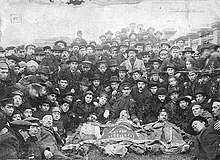Bundists
Bundisten is a term for members of Jewish organizations that go back to the General Jewish Workers' Union (Bund) in Russia .
General Jewish workers' union
The General Jewish Workers' Union of Poland and Russia was founded in Vilnius in 1897 . “Der Bund” soon became an internationally networked society of Jewish socialists , had political contacts with Lenin , Rosa Luxemburg and Otto Bauer and was active in many European countries between 1890 and 1930.
The “Bund” initially had the goal of uniting all Jewish workers in Tsarist Russia into one socialist party and helping Russian Jews to obtain legal recognition.
The Belarusian Bundists played a decisive role in the Russian Revolution of 1905 , which they led in the Jewish cities. The youth organization “ Tsukunft ” (Yiddish for future ) emerged in 1910 from their cooperation with the social democrats of the “ Social Democracy of the Kingdom of Poland and Lithuania ” (SDKPiL ). After the victory of the Bolsheviks , many “Bundists” emigrated.
Activities in Poland
The Bund shifted its main activity to Poland - where it later played a decisive role in the uprising in the Warsaw Ghetto against the Nazis - and to France .
Emigration to the West
Originally the Bundists were a secular socialist party and rejected traditional Jewish life in Russia and Poland as " reactionary ". Most of them also rejected Zionism because the Aliyah would represent a kind of flight to Palestine and would have to weaken the national rights sought in Russia .
This orientation of the Bundists changed when many Bundists decided to emigrate to Palestine, Western Europe or New York City . Although the “Bund” suffered from a decline in membership in Eastern Europe as a result, it promoted Yiddish as the Jewish national language and rejected the revival of Hebrew (which was later successful in Israel ) as a sign of a clerical Jewish society. The "renegade" Bundists, however, fell into two groups. Some became active founding members of socialist parties in Israel and indirectly promoted Hebrew, while others - especially in France and the United States - became decisive carriers of the Yiddish language and culture.
In the interwar period , the Bundists of the Paris emigration and the groups in the New England states of the United States were particularly effective. Two Paris groups, which distanced themselves from the all too activist left- wing socialists around 1922 , founded the workers' club and a few years later (1929) the Maison de la Culture Yiddish . The Bundists formed an important bulwark against the rising National Socialism in France and, on the other hand, had to resist the Communists in Paris, which were also strongly represented in the Jewish diaspora .
post war period
In 1947 at a conference in Belgium, the successor organization International Jewish Labor Union established (International Jewish Labor Bund). It is an associated organization of the Socialist International . In Israel, the Yiddish-language magazine of the Lebns Fragn was last published every two months . The chairman from 1992 to 2004 was Benjamin Nadel.
present
Numerous cultural institutions go back to the “Bundists”, including the Parisian Maison de la Culture Yiddish , which is one of the largest research institutes on the Jewish history of Eastern Europe and the Yiddish language. In Germany, the “Bund evenings” and Jewish culture days are in their tradition.
See also
- History of the Jews in France
- History of the Jews in Poland
- Tsukunft , our tsait
- Uprising in the Warsaw Ghetto , Jewish Antifascist Committee
literature
- Rebekka Denz: The "Froyenvinkl". The women's section in the national daily newspaper Naye “Folkstsaytung”. In: PaRDeS. Journal of the Association for Jewish Studies V. (14, 2008), edited by Rebekka Denz, Alexander Dubrau, Nathanael Riemer, Potsdam 2008, pp. 96–124.
- Rebekka Denz: Women in the General Jewish Workers' Union (Bund) depicted on the basis of the Yiddish-language collection of biographies “Doires Bundistn”. Potsdam 2009.
- Peter Heumos: Jewish Socialism in Exile. On the political program of the representation in exile of the General Jewish Workers' Union in Poland during World War II , in: Exilforschung. An international yearbook. Volume 4, 1986, The Jewish Exile and Other Topics, Munich 1986, pp. 62–82.
- Gertrud Pickhan : Yidishkayt and Class Consciousness. The Bund and its Minority Concept. (to be published in proceedings Jewish politics in Eastern Europe, ed. by Institute for Jewish Studies Vilnius, 2008).
- Yves Plasseraud: The Forgotten History of Personal Autonomy. Originally published in Le Monde diplomatique No. 6168 on June 16, 2000.
- Tsirl Steingart: The "Bund" in Frankraykh. Our Tsait No. 10-12, New Yoprk 1972.
- Eva J. Mangold: Yiddish and Jewish in Paris: La Maison de la Culture Yiddish. Diploma thesis, University of Vienna 2004.
- Schalom (Bern): various articles, u. a. Riga yesterday-today-morning .
- Berliner Morgenpost: Bundists and Yiddishists Festival. Issued November 19, 2003.
Web links
- In Love and In Struggle: The Musical Legacy of the Jewish Labor Bund (English)
- Sholem Aleichem College , Melbourne , the only remaining Bundist school
- The only federal website on the Internet
Individual evidence
- ^ Benjamin I. Nadel. In: legacy.com. December 30, 2014, accessed December 23, 2017 .
